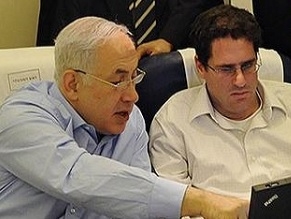|
World Jewish News

Binyamin Netanyahu with new ambassador to the US, Ron Dermer. Photo: Courtesy GPO
|
Ambassador Dermer: Academic boycott of Israel 'a travesty'
18.12.2013, Israel and the World Israeli Ambassador to the US Ron Dermer on Tuesday slammed the American Studies Association (ASA ) decision a day earlier to boycott Israeli universities, calling the move “a travesty” and hinting that it constituted anti-Semitism.
“The singling out of the Jewish state for boycott is no different than the many attempts throughout history to single out Jews and hold them to a different standard,” Dermer wrote on his Facebook page.
“There is a name for that phenomenon.
Perhaps one of the distinguished professors of the ASA could teach his boycotting colleagues what it is.”
The ambassador lamented that the ASA , rather than standing up for academic freedom and human rights by boycotting countries where professors were imprisoned for their views, chose to lash out against Israel, where “academics are free to say what they want, write what they want and research what they want.”
Dermer’s comments contrasted with a more restrained response in Jerusalem, where diplomatic officials cautioned against “playing into the hands” of boycott activists looking to stir up debate over Israel.
“That a small, radical academic union votes to boycott Israel is not a state affair that necessitates a formal response from the government,” one Foreign Ministry official said. That the tough response came from Washington, not Jerusalem, seemed designed to convey that message – that Israel views this as a localized incident.
“The BDS (boycott, divestment, sanctions) movement is not a strategic threat to Israel,” the official added, noting that occasionally the movement would have a success that garnered disproportionate media attention. “Every once in a while they will have a celebrity, like [singer] Roger Waters or [physicist] Stephen Hawking, who will speak up for them, but that doesn’t mean this is a wave or a widespread phenomenon.”
The 5,000-member American Studies Association (ASA ), which describes itself as “the nation’s oldest and largest association devoted to the interdisciplinary study of American culture and history,” announced on Monday it would participate in a boycott of Israeli universities and academic institutions.
It is the second educational group in the US to adopt the boycott. The Association for Asian American Studies did so in April. Another academic group, the vastly larger and more influential American Association of University Professors, recently reiterated its opposition to such a boycott.
The Foreign Ministry official said that while actions like these were an “annoyance,” they were blown out of proportion.
Just days before the ASA decision, Israel gained acceptance as a full member of CERN (the European Center for Nuclear Research), he pointed out – an event that, unlike the ASA story, did not make The New York Times’ front page.
In an Israel Radio interview, Deputy Foreign Minister Ze’ev Elkin dismissed the ASA as a small, radical, leftist organization.
The move did, however, have “declarative significance,” he admitted, and that was something against which Israel must be on guard. He also said Israel had to be vigilant to keep this from spreading to more influential academic groups, and that Israel and American Jewish organizations were working among those “with influence” inside those groups to keep that from happening.
Elkin said one of their aims was to turn Israel from a consensus issue in American society into a disputed one.
A panel on academic boycotts of Israel is scheduled to take place in January at the annual Modern Language Association conference in Chicago.
“Sometimes when we exaggerate in our reaction, we are playing into the hands of the boycotters, which is what they want,” Elkin said. “We are talking about a small minority that wants us to pay more attention to it and cause a discussion that will expel Israel from the consensus. We need to ensure that this does not spread beyond this small group, but on the other hand not play into their hands and give them a feeling of victory that they are the ones who will set the agenda.”
By HERB KEINON
JPost.com
|
|
